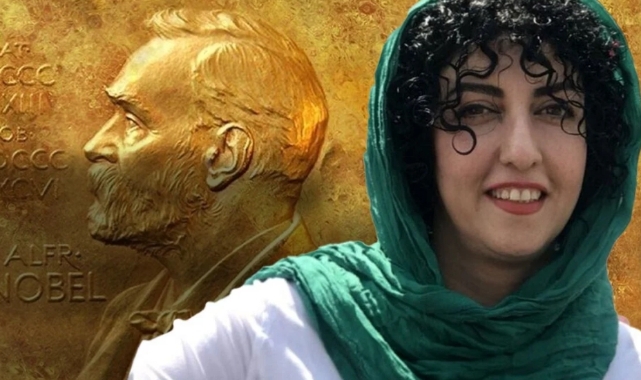Currently held in Tehran's Evin Prison: Who is Narges Mohammadi?
Narges Mohammadi, who won the 2023 Nobel Peace Prize, is constantly in prison for her work on women's rights. She was released in 2020 but sent back to prison in 2021, where she has since given reports of the abuse and solitary confinement of detained women.

The 2023 Nobel Peace Prize was awarded to Iranian Narges Mohammadi by the Norwegian Nobel Committee.
WHO IS NARGIS MUHAMMEDI?
She was born on April 21, 1972 in Iran. She attended Imam Khomeini International University and received a degree in physics. Throughout her university life, she wrote articles supporting women's rights in the student newspaper. In 2016, she was sentenced to 16 years in prison in Tehran for founding and running "a human rights movement campaigning for the abolition of the death penalty."
Mohammedi was first arrested in 1998 for her criticism of the Iranian government and spent a year in prison. In April 2010, she was summoned to the Islamic Revolutionary Court due to her membership in the DHRC. She was released on US$50,000 bail but was re-arrested a few days later. Muhammadi's health deteriorated while in custody, and she developed an epilepsy-like illness that caused her to periodically lose muscle control. A month later she was released and allowed to go to the hospital.
Narges Mohammadi (born 21 April 1972) is an Iranian human rights activist and Nobel laureate. She is the vice president of the Defenders of Human Rights Center (DHRC), headed by her fellow Nobel Peace Prize laureate, Shirin Ebadi. Mohammadi has been a vocal proponent of mass feminist civil disobedience against hijab in Iran and a vocal critic of the hijab and chastity program of 2023. In May 2016, she was sentenced in Tehran to 16 years' imprisonment for establishing and running "a human rights movement that campaigns for the abolition of the death penalty." She was released in 2020 but sent back to prison in 2021, where she has since given reports of the abuse and solitary confinement of detained women.
In July 2011, Muhammadi was retried and found guilty of "acting against national security, being a member of the DHRC, and making propaganda against the regime." She was sentenced to 11 years in prison in September. On July 31, 2012, Muhammadi was released from prison. On May 5, 2015, Muhammadi was arrested again based on new charges. The 15th Branch of the Revolutionary Court sentenced her to ten years in prison on the charge of "establishing an illegal group" and five years in prison on the charge of "international assembly and collusion". On October 8, 2020, Muhammadi was released from prison.
Muhammadi was arrested again on November 16, 2021, in the city of Karaj, Alborz province, while she was attending a memorial ceremony for Ebrahim Ketabdar, who was killed by Iranian security forces during the nationwide protests that began in November 2019.
When Nobel Peace Prize winner Sirin Ebadi won the Felix Ermacora Human Rights Prize in 2010, she dedicated the award to Muhammedi. Ebadi said, "This brave woman deserves this award more than me."
PRIVATE LIFE
In 1999, she married pro-reform journalist Taghi Rahmani. Rahmani was soon arrested. Rahmani moved to France in 2012 after serving a total of 14 years in prison. The couple has two children.
WHY IS NARGES MUHAMMEDI IN PRISON?
Nergis Muhammedi is in prison for her work on women's rights.
WHY DID SHE GET AWARD?
In the statement made by the Norwegian Nobel Committee, it was stated that the award was given to Muhammadi "for her struggle for oppressed women" in Iran.
In the statement, it was emphasized that Muhammadi, who won the award, "struggled to promote human rights and freedoms for all."
It was pointed out that Muhammadi's "brave human rights struggle brought tremendous prices" and it was noted that she was detained 13 times in Iran, 5 convictions were made against her and she was sentenced to 31 years.
The statement stated that Muhammadi was "a woman, human rights defender, and freedom fighter" and included the following statements:
"In awarding her this year's Nobel Peace Prize, the (Committee) wishes to honor her courageous struggle for human rights, freedom, and democracy in Iran. This year's Peace Prize was also awarded the previous year to demonstrate against the theocratic regime's policies of discrimination and oppression targeting women." "The award given to Muhammedi is a continuation of a long tradition of giving to those who work to advance social justice, human rights, and democracy. These are important prerequisites for lasting peace."
